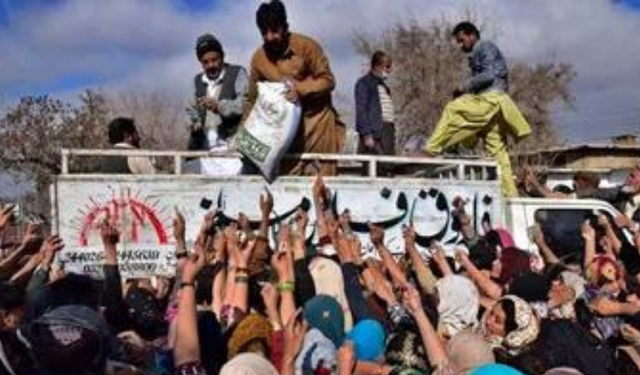Islamabad: Even as thousands of containers with essential items remain stranded at the Karachi port due the severe lack of foreign exchange reserves, Pakistan is staring at an even bigger unemployment crisis due to a lack of imports. Top businessmen in Pakistan have warned the government that a failure to lift the ban on imports will leave millions jobless and have urged the cash-strapped administration to allow manufacturing materials stuck at the Karachi port into the country. Pakistan, which is struggling with critically low dollar reserves, has imposed a ban on imports with only essential items such as food and medicines being exempt. The ban is expected to stay until the Pakistan government manages to convince the International Monetary Fund (IMF) to agree on a much needed financial bailout. Several industries in Pakistan such as steel, textiles and pharmaceuticals have largely shut down, forcing thousands of factories to close, which has deepened the unemployment problem and has worsened the Pakistan economic crisis. The steel industry in Pakistan has warned of supply-chain issues due to a shortage of scrap metal, which is melted down and turned into steel bars. Over the past several weeks, the price of these bars have reached record levels. “We directly feed materials to the construction industry which is linked to some 45 downstream industries. This whole cycle is going to be jammed,” Wajid Bukhari, head of Pakistan’s Large Scale Steel Producers Association was quoted as saying by AFP. “Most smaller factories have already downed shutters after exhausting their stocks, while some larger manufacturing units are on the verge of shutting down,” he added. With a monthly import bill of around $150 million, the steel industry in Pakistan directly and indirectly affects several million livelihoods. According to latest data from the Reserve Bank of Pakistan, foreign exchange reserves in the cash-strapped country have gone down to just $2.9 billion, which is enough to cover less than three weeks of imports. “This situation triggers fears the construction industry will close down very soon, plunging thousands of labourers into unemployment,” the Constructors Association of Pakistan said, echoing calls for steel and machinery to be exempted from the import ban. The Pakistan economy has been severely damaged by years of financial mismanagement and political instability. The situation has been exacerbated by a global energy crisis and devastating floods that submerged a third of Pakistan. Apart from a severe shortage of raw materials, record levels of inflation, all-time high fuel costs and the plummeting value of the Pakistani rupee have decimated the manufacturing industries in Pakistan. An IMF delegation left Pakistan last Friday after talks to revive an urgently-needed stalled but urgently-needed loan programme ended with no deal. The textile and garment industry accounts for around 60 percent of Pakistan’s exports. The industry, which processes items such as towels, underwear and linen for major brands across the world, employs about 35 million Pakistanis. “The textile industry should be prioritised,” said Shahid Sattar, secretary general of the All Pakistan Textile Association. “We are the mainstay of the country’s exports,” he told AFP. “If you don’t have exports, how will you shore up your foreign exchange reserves? Then consequently, how will the economy recover?” After floods devastated domestic cotton crops across Pakistan last summer, the textile sector is forced to import a significant amount of raw fabric. Factory owners appealed to the finance minister last month for “direct intervention” to unjam the backlog, which also affects dyes, buttons and zippers. “The textile industry has more or less come to a grinding halt in Pakistan. We don’t have raw materials to operate our mills,” Sattar said. Around 30 per cent of the textile mills have shut down operations completely, while the rest are working at less than 40 per cent capacity. Tauqeer ul Haq, the head of the Pakistan Pharmaceutical Manufacturers Association, said 40 medicine factories were on the brink of closure because of a lack of key ingredients. Pakistani economist Kaiser Bengali said the supply-chain crisis was “feeding inflation and also hitting the government’s revenues”. It is also escalating unemployment and fuelling poverty, with a large proportion of construction and factory workers in Pakistan paid daily. “On average during regular production, workers are paid for around 25 days (per month) but now they are getting wages for 10 to 15 days. While some companies have even suspended their production and workers will only get paid once manufacturing resumes,” Bengali told AFP. Pakistan’s Finance Minister Ishaq Dar had said last week that businesses in the counry must “let the money come in from the IMF” before letters of credit would resume for imports and end the logjam. Meeting the conditions of the IMF bailout, such as by raising the already record high prices of petrol and energy, is also expected to increase inflation in Pakistan, but should pave the way for further financial support from friendly nations. Read all the Latest News , Trending News , Cricket News , Bollywood News , India News and Entertainment News here. Follow us on Facebook, Twitter and Instagram.
Top businessmen in Pakistan have warned the government that a failure to lift the ban on imports will leave millions jobless and have urged the cash-strapped administration to allow manufacturing materials stuck at the Karachi port into the country
Advertisement
End of Article


)

)
)
)
)
)
)
)
)



